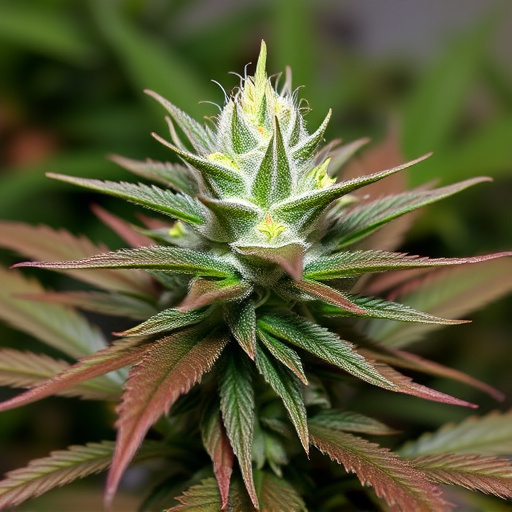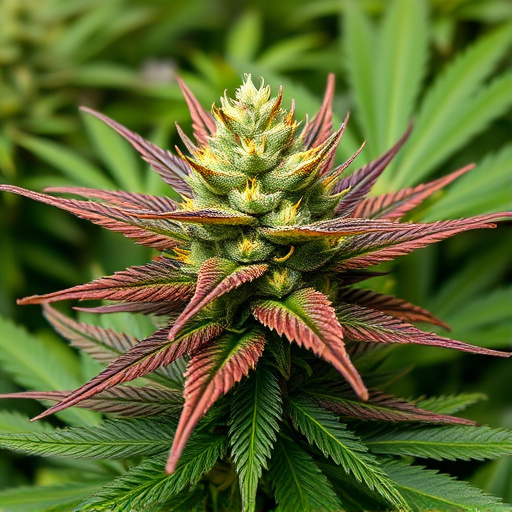High-THC cannabis strains offer intense experiences sought after for potent pain management or chronic condition relief, but users should understand each strain's unique composition. THC interacts with the body's endocannabinoid system to reduce inflammation and slow the central nervous system, potentially providing relief from chronic pain and neurological conditions. However, elevated THC levels can increase heart rate, blood pressure, and risk of heightened anxiety, paranoia, and distorted perceptions. For effective medical pain management, low-to-mid THC strains with higher CBD content are gaining popularity for minimizing psychotropic side effects while providing discomfort relief.
“Unraveling the effects of high-THC cannabis strains is essential, especially with their growing popularity. This article explores the intricate relationship between these potent strains and both the body and mind. We delve into the understanding of high-THC composition and its distinct impact on physiological processes.
From managing pain to potential mental health implications, we examine the benefits and risks associated with THC-rich cannabis. By exploring these aspects, readers can make informed decisions regarding their well-being and the appropriate use of cannabis strains for pain relief.”
- Understanding High-THC Strains and Their Composition
- The Impact of THC on the Body: Physiological Effects
- Mental Health and High-THC Cannabis Strains: Potential Benefits and Risks
Understanding High-THC Strains and Their Composition

High-THC (tetrahydrocannabinol) strains are a category of cannabis varieties known for their potent effects, often sought after by users looking for intense experiences or managing chronic conditions like pain. Understanding what makes these strains unique is essential when considering their potential benefits and risks.
Cannabis strains with high THC levels typically have elevated concentrations of this psychoactive compound compared to their low-THC counterparts. While cannabis contains over 100 cannabinoids, THC is the most well-known due to its mind-altering properties. In addition to THC, these high-THC strains may also have higher levels of other cannabinoids and terpenes—natural compounds that contribute to the plant’s aroma and flavor, and may further influence its effects on the body and mind. The composition of these strains can vary widely, making it crucial for users to be aware of their specific makeup before consumption, especially when utilizing cannabis for medicinal purposes, like managing pain.
The Impact of THC on the Body: Physiological Effects

THC, the primary psychoactive compound in cannabis, has significant physiological effects on the body. When consumed, THC interacts with the endocannabinoid system (ECS), a complex network of receptors and enzymes that regulate various bodily functions such as pain perception, appetite, mood, and memory. This interaction can lead to a range of physical impacts. For instance, it may reduce inflammation, which could explain why cannabis strains high in THC are often sought after for managing chronic pain related conditions. Additionally, THC can slow down the central nervous system, inducing feelings of relaxation and reducing muscle spasms—benefits that make it potentially useful for certain neurological disorders.
However, the physiological effects don’t stop there. THC also influences heart rate and blood pressure, potentially leading to a temporary increase in both. This is something to consider when using cannabis strains for pain or other conditions, as it could interact with other medications or cause lightheadedness, especially in individuals with pre-existing cardiovascular issues. Furthermore, the impact on cognitive functions, such as memory and perception, can be immediate and intense, leading to a altered sense of reality and time distortion—effects that, while temporary, are an essential part of the THC experience.
Mental Health and High-THC Cannabis Strains: Potential Benefits and Risks

Cannabis strains high in tetrahydrocannabinol (THC) have been a subject of interest for their potential effects on mental health, especially when it comes to managing pain. While some users claim significant relief from conditions like chronic pain, anxiety, and depression, there are also concerns about the risks associated with elevated THC levels.
High-THC strains can induce euphoria and relaxation but may also lead to heightened anxiety, paranoia, and distorted perceptions in certain individuals. These mental health effects are particularly relevant when considering cannabis for medical purposes, especially as the right strain selection is crucial. For pain management, specific low-to-mid THC strains with higher cannabidiol (CBD) content have gained popularity due to their potential to alleviate discomfort while minimizing psychotropic side effects.
High-THC cannabis strains, with their potent composition, offer both potential therapeutic benefits and risks. While studies suggest they can alleviate certain types of pain, anxiety, and depression, excessive THC exposure may lead to cognitive impairment and heightened anxiety. Understanding the unique impact of high-THC strains on both the body and mind is crucial when considering these varieties for medical use, especially in managing chronic pain. Remember that, as with any substance, informed decision-making and moderation are key to harnessing the benefits while mitigating the risks.














